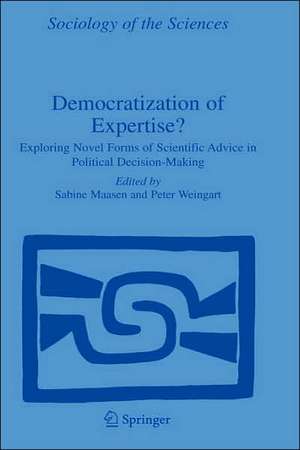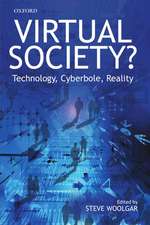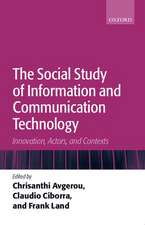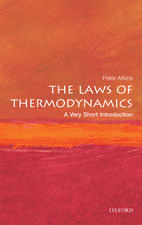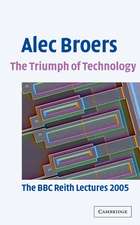Democratization of Expertise?: Exploring Novel Forms of Scientific Advice in Political Decision-Making: Sociology of the Sciences Yearbook, cartea 24
Editat de Sabine Maasen, P. Weingarten Limba Engleză Hardback – 12 ian 2006
Scientific knowledge and the ‘experts’ that represent it no longer command the unquestioned authority and public trust that was once bestowed upon them, and yet, policy makers are more dependent on them than ever before. This collection of essays explores the relations between science and politics with the instruments of the social studies of science, thereby providing new insights into their re-alignment under a new régime of governance.
| Toate formatele și edițiile | Preț | Express |
|---|---|---|
| Paperback (1) | 637.93 lei 6-8 săpt. | |
| SPRINGER NETHERLANDS – 5 sep 2009 | 637.93 lei 6-8 săpt. | |
| Hardback (1) | 644.30 lei 6-8 săpt. | |
| SPRINGER NETHERLANDS – 12 ian 2006 | 644.30 lei 6-8 săpt. |
Din seria Sociology of the Sciences Yearbook
-
 Preț: 360.31 lei
Preț: 360.31 lei - 18%
 Preț: 951.91 lei
Preț: 951.91 lei - 18%
 Preț: 947.98 lei
Preț: 947.98 lei - 18%
 Preț: 954.62 lei
Preț: 954.62 lei - 18%
 Preț: 1223.25 lei
Preț: 1223.25 lei - 15%
 Preț: 646.30 lei
Preț: 646.30 lei - 18%
 Preț: 949.73 lei
Preț: 949.73 lei - 18%
 Preț: 949.73 lei
Preț: 949.73 lei - 18%
 Preț: 1227.99 lei
Preț: 1227.99 lei - 18%
 Preț: 1223.74 lei
Preț: 1223.74 lei - 24%
 Preț: 789.60 lei
Preț: 789.60 lei - 18%
 Preț: 953.97 lei
Preț: 953.97 lei - 18%
 Preț: 1229.73 lei
Preț: 1229.73 lei - 15%
 Preț: 647.40 lei
Preț: 647.40 lei - 18%
 Preț: 951.77 lei
Preț: 951.77 lei - 18%
 Preț: 947.67 lei
Preț: 947.67 lei -
 Preț: 387.38 lei
Preț: 387.38 lei - 18%
 Preț: 952.26 lei
Preț: 952.26 lei - 15%
 Preț: 643.00 lei
Preț: 643.00 lei - 18%
 Preț: 950.33 lei
Preț: 950.33 lei - 15%
 Preț: 643.16 lei
Preț: 643.16 lei - 18%
 Preț: 950.52 lei
Preț: 950.52 lei -
 Preț: 385.61 lei
Preț: 385.61 lei - 18%
 Preț: 951.47 lei
Preț: 951.47 lei - 24%
 Preț: 684.85 lei
Preț: 684.85 lei
Preț: 644.30 lei
Preț vechi: 758.01 lei
-15% Nou
Puncte Express: 966
Preț estimativ în valută:
123.29€ • 128.98$ • 102.41£
123.29€ • 128.98$ • 102.41£
Carte tipărită la comandă
Livrare economică 03-17 aprilie
Preluare comenzi: 021 569.72.76
Specificații
ISBN-13: 9781402037535
ISBN-10: 1402037538
Pagini: 248
Ilustrații: VIII, 238 p.
Dimensiuni: 156 x 232 x 19 mm
Greutate: 0.53 kg
Ediția:2005
Editura: SPRINGER NETHERLANDS
Colecția Springer
Seria Sociology of the Sciences Yearbook
Locul publicării:Dordrecht, Netherlands
ISBN-10: 1402037538
Pagini: 248
Ilustrații: VIII, 238 p.
Dimensiuni: 156 x 232 x 19 mm
Greutate: 0.53 kg
Ediția:2005
Editura: SPRINGER NETHERLANDS
Colecția Springer
Seria Sociology of the Sciences Yearbook
Locul publicării:Dordrecht, Netherlands
Public țintă
Professional/practitionerCuprins
What’s New in Scientific Advice to Politics?.- Bioethical Controversies and Policy Advice: The Production of Ethical Expertise and its Role in the Substantiation of Political Decision-Making.- Advisory Systems in Pluralistic Knowledge Societies: A Criteria-Based Typology to Assess and Optimize Environmental Policy Advice.- Institutional Design for Socially Robust Knowledge: The National Toxicology Program’s Report on Carcinogens.- Representation, Expertise, and the German Parliament: A Comparison of Three Advisory Institutions.- Expertise and Political Responsibility: The Columbia Shuttle Catastrophe.- Knowledge and Decision-Making.- Science/Policy Boundaries: A Changing Division of Labour in Dutch Expert Policy Advice.- Inserting the Public Into Science.- Between Policy and Politics.- Participation as Knowledge Production and the Limits of Democracy.- Judgment Under Siege: The Three-Body Problem of Expert Legitimacy.
Textul de pe ultima copertă
‘Scientific advice to politics’, the ‘nature of expertise’, and the ‘relation between experts, policymakers, and the public’ are variations of a topic that currently attracts the attention of social scientists, philosophers of science as well as practitioners in the public sphere and the media. This renewed interest in a persistent theme is initiated by the call for a democratization of expertise that has become the order of the day in the legitimation of research funding. The new significance of ‘participation’ and ‘accountability’ has motivated scholars to take a new look at the science – politics interface and to probe questions such as "What is new in the arrangement of scientific expertise and political decision-making?", "How can reliable knowledge be made useful for politics and society at large, and how can epistemically and ethically sound decisions be achieved without losing democratic legitimacy?", "How can the objective of democratization of expertise be achieved without compromising the quality and reliability of knowledge?"
Scientific knowledge and the ‘experts’ that represent it no longer command the unquestioned authority and public trust that was once bestowed upon them, and yet, policy makers are more dependent on them than ever before. This collection of essays explores the relations between science and politics with the instruments of social studies of science, thereby providing new insights into their re-alignment under a new régime of governance.
Scientific knowledge and the ‘experts’ that represent it no longer command the unquestioned authority and public trust that was once bestowed upon them, and yet, policy makers are more dependent on them than ever before. This collection of essays explores the relations between science and politics with the instruments of social studies of science, thereby providing new insights into their re-alignment under a new régime of governance.
Caracteristici
Research at the frontier at the science/politics interface Combination of conceptual and empirical studies Includes major scholars in the field
